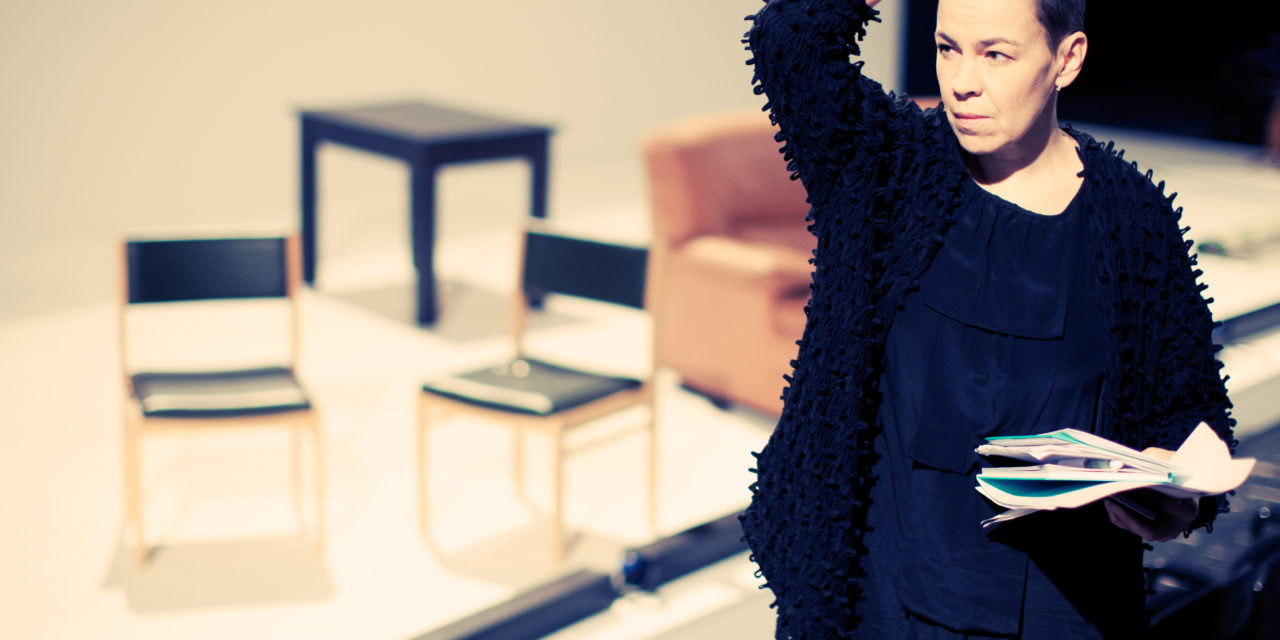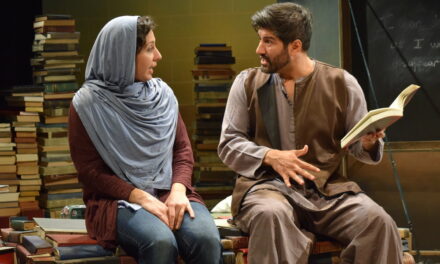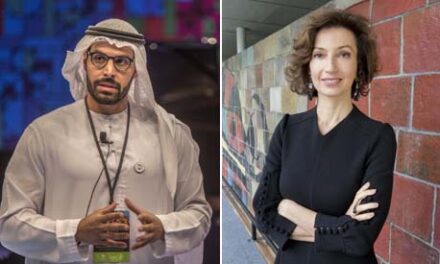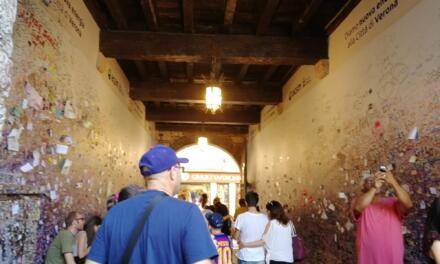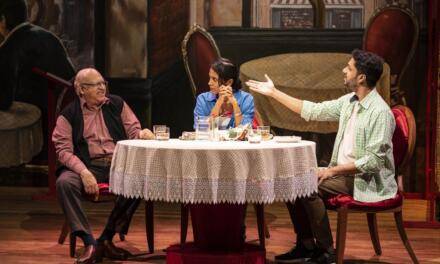Theatre NO99 is a theatre in Tallinn, Estonia with a troupe of 10 actors at the centre of it, lead artistically by Tiit Ojasoo and Ene-Liis Semper. Theatre NO99 is a serial work of contemporary art. At the beginning of it was an idea that considering the inherently finite nature of time and its finality, time should instead be measured backwards. This served as the impetus for Tiit Ojasoo and Ene-Liis Semper’s idea for a theatre where only 99 stage productions will open and which thus moves along sequential numbers to zero, towards oblivion. This, in 2005, brought into being Theatre NO99, the artistic directors of which they have now been for 10 years already. Over the years many of its productions have achieved considerable success at the most prestigious European festivals.
Theatre NO99 is a platform for different types of works of art. A simulacrum can be born here that theatralises all of society, brings together 7500 people to witness the birth of a new fictitious political movement and shifts the limits of the role of performing arts in contemporary democracies. Or a stage production using dialogue based on a chrestomathic play. Or a dystopia that elucidates the dark sides of globalization. Or a musical with the depth of an antique Greek tragedy about a tyrannos of an Eastern European polis. Or an internationally co-produced stage production that brings together actors from different theatrical cultures. Or a theatre building made of straw in the middle of the center of the city, with the world’s top names performing in it. Or a documentary film. Or a television series. Works by Theatre NO99 are linked by what is mistakenly thought of as social sensitivity, but it is really that we see poetic energy as the central criteria for projects tackling issues of the contemporary world.
Theatre NO99 is known for its lack of compromise – both in artistic choices and subjects that concern public issues. What is your credo?
Firstly, compromise is never a good tool in art … at least not based on our experience. That may be difficult to stick to with large teams, which is why we have included an optimal number of people in ours.
When Theatre NO99 was established, what made it happen was the desire to conjoin the qualities of various contemporary disciplines in our work – performance/figurative art/music etc. The theatre’s core is our 10-strong permanent company: we prefer to work with the same people from one production to the next, this provides the actors an opportunity to grow together and develop through all these different challenges. We regard our theatre as a serial act of conceptual art: at the time when the company was established, we also made the decision to number all our productions, beginning at 99 and finally reaching zero. A significant part of that is a poetic vision that, on the one hand, derives from the temporal nature of the art of theatre: we all know that a theatre performance only exists in the moment. On the other, however, the world that surrounds us has created a system for marking the time where each passing year adds a number, so people prefer to think of time as an infinite resource, but we decided to take the opposite approach – to acknowledge from the start that no creative collective can last forever.
Therefore – let us value the moment here and now, focus on that and give our absolute maximum to this very performance tonight, to what is happening right now. Equally, the rest of our arsenal is subservient to this idea: the theatre uses black and white, intentionally minimal brand aesthetics, the photos used on posters and programmes are always from rehearsal, etc.
What importance do you place on a theatre – alongside its base function – being also a think tank, reflecting and conceptualizing society, leading opinion? It’s a question that arises time and again, as one can often get the impression that theatre collectives can get caught up in their professional ‘bubble’ and may only have the energy to address internal problems.
First of all, as our working method consists largely of improvisation geared towards a particular subject matter and often there is no base text that we depart from – so to say – and the material for the production is created in rehearsal, it gives us the freedom to address various topics. It allows us to do what seems most important at that given moment in time. In other words, we do not depend on existing scripts, which gives us flexibility and the opportunity to genuinely be really in the moment, choose our focus, and utilize all means known to us in creating a new production.
As we are bound by the numbering system mentioned above, it is vitally important for us to regularly challenge ourselves, try to surprise ourselves. Take a step somewhere we haven’t been before, do something not done before, primarily as artists. Thus, during the 12 years we have been active we have repeatedly touched upon socially sensitive subjects, but we have never defined our agenda from merely that point of view. We have made a production about the birth of a fictitious political party that had an audience of 7000. And an ancient-tragedy-inspired rock musical about the mayor of Tallinn as the tyrannos of a polis in Eastern Europe. And a two-hour introspective live broadcast about Estonian memory, about the deeper causes of a nation turning away from the outside world. And a guided city tour about corruption.
But we have never wanted to limit ourselves to just ‘socially sensitive’ challenges.
When we feel like it, we do make more traditional drama productions based on a chrestomathic play. Or put together an absurdist comedy. Or focus on our physical existence for a change and dive into the mud – literally speaking – as we did in the production NO43 Filth.
I feel that the way the question is phrased is somewhat limiting. Naturally, NO99 is a think tank and a mirror of society, however, in the first instance it is a platform for various works of art.
It seems to be that first, we ought to define the phrase ‘the base function of theatre’, which was part of the question. What is it?
For us, it is art – in its deepest meaning. It seems to me that when a theatre company gets accused (and rightly so) of providing mere entertainment, it often makes a U-turn by adopting the role of a social scientist and thereby loses its existential dimension entirely, but that is boring because it is rational. Picking at social pressure points every day is just as dull as traditional well-made storytelling. In essence, storytelling remains mere storytelling – even if the subject is children in famine.
I get the feeling that the world around us is becoming simplified to the extreme, people’s imagination is withering away. The ability to focus is limited to ever shorter moments. Everyone appears to know everything about everything, but really, we know nothing about anything. Therefore, as an artist and theatre-maker, it’s imperative to force ourselves to dive in time and again, to be able to surface somewhere we haven’t been before.
The theatre is a game, an illusion. Shifting realities. Manipulation. Risk. A composition that can be constructed out of very different elements. If you add these elementary truths to the theory of conceptual art, you can keep experimenting infinitely and the results will not be so safe and predictable.
In many places around Europe, particularly in Hungary, Poland and Slovakia, radical right-wing politics have infringed rather forcefully on the art world, and once again standards of ‘correct art’ are being implemented. Fortunately, that is not yet the case in Estonia. What are the options for theatre in these circumstances, and what would Theatre NO99 do, were it to find itself in an equivalent political situation?
Naturally, this is complete speculation, but I do not see a reason why we should surrender our current artistic vision in any given political situation. A particular word, a specific image or even a whole subject matter can be censored, but I am fairly certain that art is always able to come up with new combinations of elements aligned in such a way that the message conveyed passes right through the net of censorship. In truth, I think the decisive factor in a situation like that is how demanding the audience will be able to be.
Let me continue and finish with the subject of Estonia – why have you chosen to work in Estonia when the doors to the global theatre scene are wide open? What makes the local working environment special and interesting?
Firstly, the opportunity to work with the same ensemble cast is relatively unique. We are all aware that big, state-funded repertory theatres (in Germany, for example) have large ensemble companies on salary, unfortunately, they are very large indeed and the qualities of the actors growing together and developing a sense of each other on stage are not fully realized. Therefore, at NO99 the opportunity of working together long-term with a smaller ensemble cast was a conscious choice for us, and we know to value it highly. Having been able to experiment with various styles (physical theatre, improvisation, musical productions, psychological drama, socially sensitive projects) with the same group of people we have reached a relatively high level of flexibility. We are able to freely choose the means we wish to use in future works. That is a great luxury.
Secondly – we are united by a Nordic identity, shaped by Estonia being a small country and by its geographical location. This is a concept difficult to explain in an ever-globalizing world. There is a kind of specific point of view that one is only able to hold here. The question is whether to consider it a virtue or a flaw.
When we – together with the other co-founder of NO99, Tiit Ojasoo – go to direct something outside our own theatre company, we gain fresh experience and expand our notion of theatre as a concept.
But still, we are able to express ideas that matter to us most sensitively and with the greatest accuracy working with the people with whom we have learned to ‘breathe’ together over the last dozen years.
Original Publisher: Estonian Theatre Agency
This article was originally published in Estonian Theatre newspaper in summer 2017 and has been reposted with permission.
This post was written by the author in their personal capacity.The opinions expressed in this article are the author’s own and do not reflect the view of The Theatre Times, their staff or collaborators.
This post was written by Liisi Aibel.
The views expressed here belong to the author and do not necessarily reflect our views and opinions.

